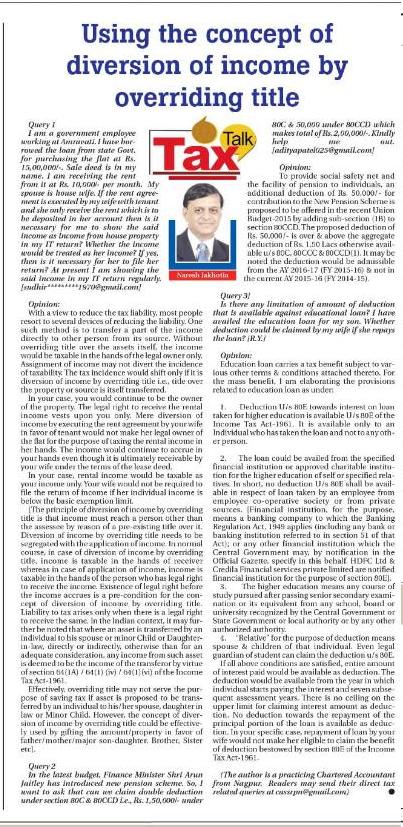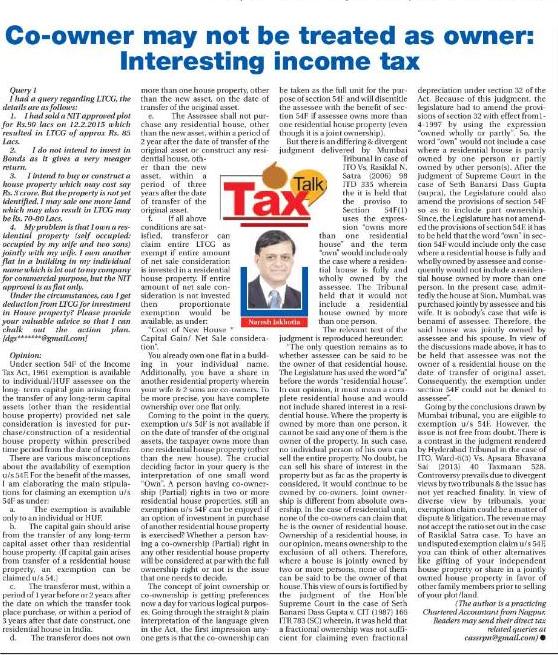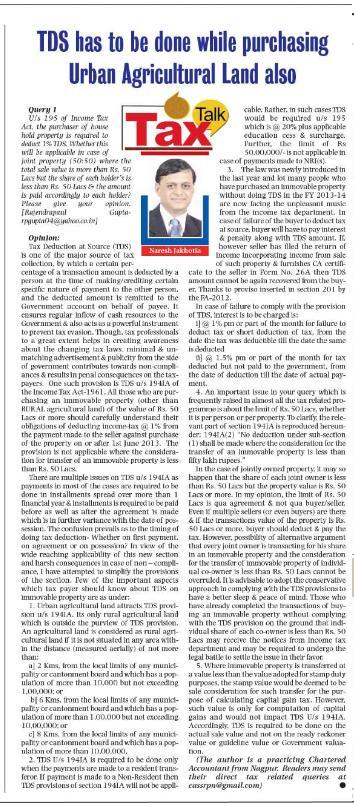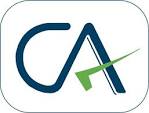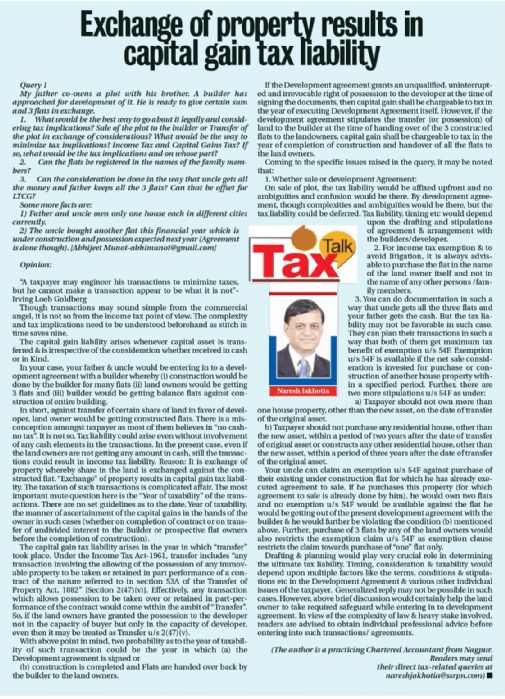Article Details
| Taxation of income from delivery based / intra-day share trading and F & O Transactions |
|
TAX TALK-26.10.2015-THE HITAVADA TAX TALK CA. NARESH JAKHOTIA Chartered AccountantTaxation of income from delivery based / intra-day share trading and F & O Transactions Query 1] I have income from intra-day trading in shares & intra-day trading in future & options. I have queries as under: 1. Which ITR form to be filled? 2. What is the rate of income tax? 3. If my profit from above is Rs. 6,00,000/- in a FY , then would the basic exemption limit & IT relief under chapter VI- A be deducted while calculating IT on total income? [Col Sisir Misra- indian army veteran-sisir_misra@yahoo.com] Opinion: One of the funny things about the stock market is that every time one person buys, another sells, and both think they are astute- William Feather Many people believe that share trading & commodity transaction is one of the simplest way of making money in the stock market. Obviously, it is imperative to understand the tax implication on such transactions. Before replying to specific points of the querist, one needs to carefully understand the income tax law on taxability of income arising from shares trading and Future & Options.
i] If shares are purchased on a particular day and sold next day or afterwards then it is not treated as ‘Speculative business'. ii] Income from delivery based transactions could either be categorized under the head “Income from Business” or under the head “Income from Capital Gain” depending upon various factors. The prominent factors that play an important role in determining whether it is a business assets or capital assets are: (a) Volume/Nature of transactions. (b) Intention/Logic behind investments. (c) Holding period of shares (d) Investment of own funds or a borrowed fund. (e) Other business activities of the assessee. Etc. iii] If treated as capital gain & the sale transactions is done through stock exchange then (a) Long Term Capital Gain would be exempt whereas (b) short term capital gain would be taxable @ 15%. iv] If treated as business income then entire income would be taxable like other regular income of the taxpayer and tax liability would be in accordance with the applicable tax slab. v] If share trading activity is considered as business, tax audit would be mandatory if the turnover exceeds Rs. 1 Crore or if the profit offered for taxation is less than 8% of the turnover. 3. Income from Future & Options (Derivative) Transactions: i] Transactions in derivatives are specifically excluded from the category of “Speculative transaction” if the transaction is carried out (a) on a recognised stock exchange (b) the securities transaction tax is paid and (c) trade is supported by contract note. Profit/Loss in derivatives (futures and options) is treated as non-speculative business even though delivery is not there in such transactions. ii] Profit/loss from such transactions will be considered as normal business income and loss only. iii] No special tax rate is applicable for taxing profit from derivatives transactions & tax rate shall at normal rates applicable to an Individual. iv] Unabsorbed non-speculative business loss can be carried forward for eight years to be set off against business income of subsequent years. v] Applicability of Audit in case of derivative (F&O) Trading: Taxpayer should carefully note that tax audit provision (as per section 44AB) will be applicable to the transactions in F&O also as income from derivative trading is considered as normal business income. To be more precise, if turnover from derivative transactions exceeds Rs. 1 Crore, taxpayer would be required to get the accounts audited. Tax audit will also be applicable if the net profit from such transactions is less than 8% of the turnover from such transactions (u/s 44AB r/w section 44AD). Interestingly, in case of Loss from derivative trading, since profit (Loss in this case) is less than 8% of the turnover, Tax Audit will be applicable. The most crucial point arises with regard to the determination of the “Turnover” in the case of F & O. The total of profit and loss (i.e., positive and negative figure) shall be taken as turnover. It makes no difference whether the difference is positive or negative for computing turnover. Aggregate o the differences, whether positive or negative is considered as “turnover”. While arriving at the taxable profit, all the expenses incurred for earning income like telephone, mobile, conveyance, depreciation on assets used for the purpose of business etc would be admissible as deduction. vi] Since, income from F&O trading is to be treated as business income, therefore an individual filing return with F&O income has to file ITR in form ITR 4 or 4S, as the case may be. Now coming to the specific points raised by the queriest; 1. Since you have income from intra-day trading in shares & F & O, both of which is taxable under the head “Income from Business”, return has to be filed in ITR-4 or 4S. (Readers may refer Tax talk dated 10.08.2015 to know more about ITR 4 vis a vis 4S & about various other ITR forms). 2. Both the income would be taxable as per applicable tax slab. No special tax slab is there for taxing intra-day shares income or F & O income. 3. There are no limitations & restrictions on deduction under Chapter VI-A against (a) Intra-day share income or (b) F & O income. Further, you are eligible to consider basic exemption limit while working out your tax liability. [The author is a practicing Chartered Accountant from Nagpur. Readers may send their direct tax related queries at SSRPN & Co 10, Laxmi Vyankatesh Apartment C.A. Road, Telephone Exch. Square Nagpur-440008 or email it at nareshjakhotia@ssrpn.com. If you wish to unsubscribe from the mailing list, please reply back “unsubscribe”]. |
 |




.png)
